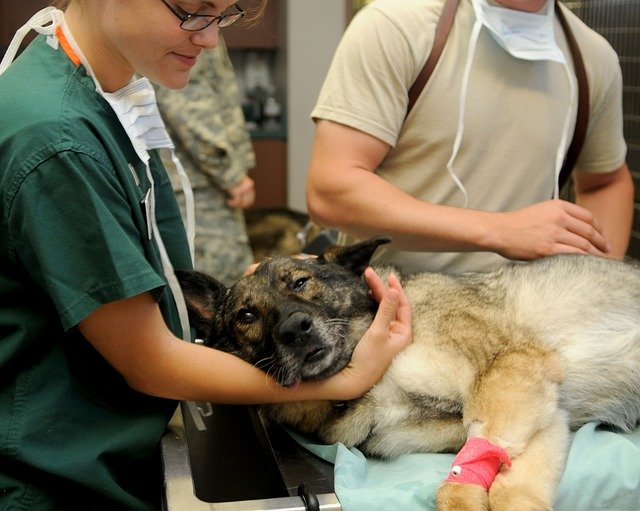- Full AVMA-CVTEA accreditation, allowing graduates to qualify for the VTNE examination.
- Study online, at your own pace, wherever you are.
- Receive ongoing support from our Veterinary Academy Team.
Animals, like people, often need a wide range of medical attention.
They need veterinarians to help them treat various illnesses and injuries.
And many of these vets specialize in one of 12 veterinary technician (vet tech) careers.
They have expertise in either:
- Anatomy
- Pathology
- Behavior
- Nutrition
They are able to get their certificate from the National Association of Veterinary Technicians of America (NAVTA).
NAVTA maintains its own specialties portal.
Here, vet techs can find the program they want to attend to gain advanced knowledge and skills.
To get a technical certification in a specialized field, you must:
- Enroll in a two-year associate’s degree
- Complete the courses of study
- Pass the examination
Upon successful completion, you will now become a certified veterinary technician specialist.
What’s more, these specializations come with higher pay.
And on this page, you will have an overview of the five top-earning jobs among the 12 vet tech careers.
- Anesthesia and analgesia technician
- Surgical technician
- Emergency and critical care technician
- Zoological medical technician
- Equine nursing technician
Table of Contents
The Significance of Vet Tech Specialization
According to NAVTA, vet techs are the veterinarians’:
- Nurses
- Lab technicians
- Radiography technicians
- Anesthetists
- Surgical nurses
- Client educators
But vet techs are more than that.
We see vet techs as the heart of the veterinary practice.
Its skeletal workforce.
They perform essential tasks for the health and welfare of animals.
And veterinary science places heavy importance on these expertly-trained technicians.
Anesthesia & Analgesia Technician
An anesthesia and analgesia technician is one of the highest paying vet tech careers
According to PayScale, they earn an average salary of about $33,969.
They earn this much because of their valuable help to the veterinary surgeons.
They assist vets with performing surgical procedures, such as:
- Preparing pre-anesthetic procedures
- Administering proper anesthesia and sedative dosage
- Maintaining sedation of the animal through close monitoring
- Managing the animal’s emergence from the sedative state
And it does not end there.
They are also expected to do:
- Post-anesthetic care of the animal
- Maintenance of specialized equipment
Pro Tip: Graduating with a four-year degree from an accredited school increases your earning potential.
Surgical Technician
A surgical technician is also a well-paid career that earns an average salary of $48,207 (Zip Recruiter).
To become one, you will have to:
- Complete a course
- Get a certification from the Academy of Veterinary Surgical Technicians
Only then can you assist the veterinarian during surgical procedures and diagnoses, including:
- All levels of wound care, such as:
- Changing and checking wound dressings
- Maintenance of healing wounds
- Counseling owners of wounded animals
- Proper sterility practices
- Diagnostic tests
- Surgery
Also, you will need to perform some clerical and administrative work at the vet clinic like:
- Post-op consultations
- Medication dosings
- Filling of animal prescriptions
- Administering IVs, catheters, and/or blood draws
Emergency & Critical Care Technician
An emergency and critical care technician must be versatile and highly qualified.
They must also work well under pressure, able to remain calm and focused.
This ensures that they can save an animal’s life whenever an emergency happens.
If you believe you can do all these things, then you are already halfway ready for this field.
Pro Tip: Be prepared to always be on-call.
Your responsibilities, in some way, are the same as a surgical technician.
Only, you will have to help stabilize the animals in need of critical medical attention.
In the intensive care unit, or at the 24-hour animal hospital, you will:
- Take x-rays, blood, and/or stool samples
- Monitor vitals
- Insert catheters
- Give injections of medications or fluids
- Do wound care
- Keep the patient’s files in order
These heavy duties have made these technicians earn an average salary of $68,000 (PayScale).
And they deserve it so.
Other Vet Tech Fields to Consider
Even though we could not find the salary data for these two fields, we still wanted to include them for you.
Zoological Medical Technician
The zoological medical technician career is ideal for individuals who:
- Enjoy taking care and being with exotic animals
- Finds zoos, aquariums, or wildlife preserves as learning environments
Here, you will work as the vet’s close assistant.
You will help deal with the various exotic animals you encounter, including:
- Wound care
- Taking radiographs
- Operating diagnostic machinery or software
- Filling prescriptions
- Administering fluids and medications
- Assisting with general physical exams
- Inserting catheters
- Cleaning of surgical equipment
Equine Nursing Technician
An equine nursing technician is also known as large animal vet tech.
This work is best for people who love horses, rural environments, and animal husbandry.
If this is you, then you can enroll at the Academy of Equine Veterinary Nursing Technicians.
The academy helps you gain the necessary knowledge and skills to assist the vets in, but not limited to:
- Administering medication
- Bandaging wounds
- Preparing for surgeries or procedures
- Running blood or fluid tests
- Taking x-rays
- Giving injections
You will also acquire other specialized skills like:
- Jogging horses into a pen to test how their lameness or injury has improved
- Maintaining physical therapy records for follow-ups or outside consultation
- Scheduling appointments and dealing with several animal husbandries, including cows, sheep, and hogs
Your knowledge of equine anatomy and locomotion will improve your ability to account for kicks and bites.
Get your accredited and budget-friendly associate degree or career diploma entirely online!
Veterinary AssistantVeterinary TechnicianVet Office ManagerDog ObediencePet GroomingSponsored Online Programs.

